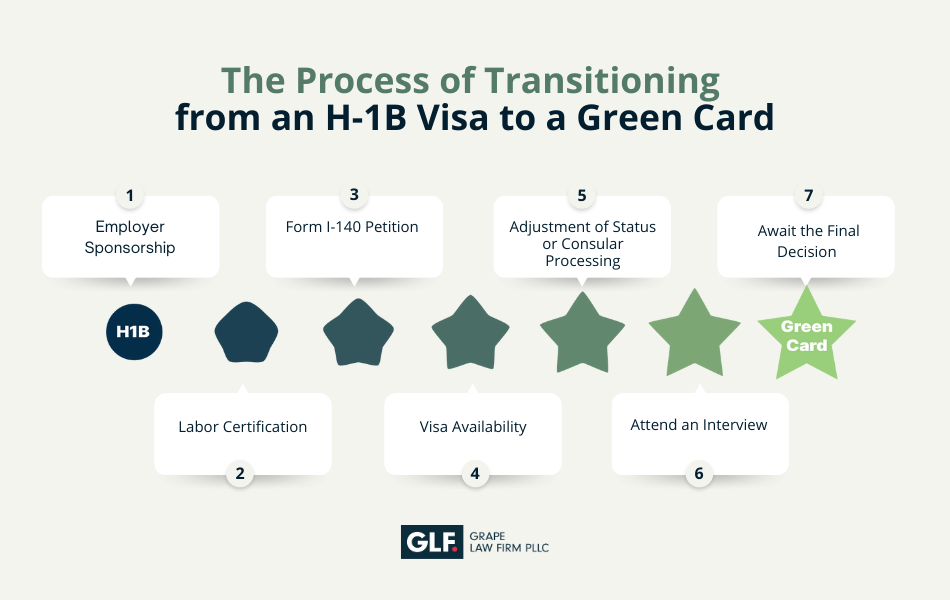The H-1B visa is a non-immigrant visa that allows foreign workers with specialized skills to work in the United States of America. Many H-1B visa holders seek permanent residency or a Green Card in the United States.
In this article, we'll discuss the process of transitioning from an H-1B visa to a green card.
What is an H-1B Visa?
The H-1B visa is a non-immigrant visa for foreign workers in the fields of specialty occupations. The H-1B Visa is an opportunity for U.S. employers to hire qualified people from all around the world. The H1B visa is valid for up to three years. The visa can be extended for another three years.
Specialty occupations require specialized knowledge and a bachelor's degree or higher in a specific field of study. In case of the absence of the degree, the work experience in the field of study is considered the equivalent of the required degree. For example, if you don't have a four-year bachelor's degree in a specialty occupation, 12 years of work experience in the field will be accepted.
To learn more about the H1B visa, its requirements, and the application process, read our blog "H-1B Visa FAQ: Everything You Need to Know". You can also visit our library on our website to find out more about this visa.
What is a Green Card?
A green card, otherwise known as a permanent resident card, is a document that allows foreign nationals to live and work in the United States permanently. It is issued by the U.S. Citizenship and Immigration Services (USCIS) and provides many of the same benefits as U.S. citizens, including the ability to work and travel freely.
Our article "What is a Green Card and How to Apply for It?" has all the answers to your questions about Green Card.
The Process of Transitioning from an H-1B Visa to a Green Card
Before transitioning from an H-1B visa to a green card, it is essential to review the eligibility requirements.
If you have an approved labor certification, your employer must file an I-140 Petition for Alien Workers with U.S. Citizenship and Immigration Services (USCIS).
Additionally, an individual must be able to demonstrate that they have the financial means and ability to support themselves throughout the application process without resorting to social assistance or sponsored maintenance.

Transitioning from an H-1B visa to a green card involves several steps. Here's a general overview:
Employer Sponsorship
In most cases, the first step is to have an employer sponsor the H-1B visa holder for a green card. The employer must file an Immigrant Petition for Alien Worker (Form I-140) with the USCIS on behalf of the employee.
Labor Certification
The employer must also obtain a labor certification from the U.S. Department of Labor (DOL).
The company that wants to hire a foreign worker should demonstrate that there is no fitting U.S. citizen candidate for the position for the labor certification process. In addition, they are asked to prove to hire a foreign worker will not affect U.S. workers' wages and working conditions.
Adjustment of Status
If the H-1B visa holder is living in the United States, they may be able to adjust their status to that of a permanent resident without leaving the country. The employer must file an application to Register Permanent Residence or Adjustment of Status (Form I-485) on behalf of the employee.
Consular Processing
If the H-1B visa holder is outside the United States, they must go through consular processing to obtain a green card. This involves going to a U.S. embassy or consulate in their home country to complete the application process.
Visa Availability
The final step is to wait for a visa to become available. Each year there is a limited number of green cards issued. And there are often long waiting periods for specific categories of applicants. The H-1B visa holder must wait for their priority date to become current before being granted a green card.
Attend an Interview
After submitting your application, you may be asked to attend an interview with a USCIS Immigration Officer. The officer will ask questions about your qualifications and profile during the interview. Your answers should match the information submitted in your application form.
Medical Exam (If Necessary)
Additionally, depending on which visa type you are applying for, you may need to undergo a medical exam by a USCIS-approved doctor. The doctor will assess your health condition and ensure that any infectious diseases or situations do not prevent you from receiving permanent residence status in the U.S.
Await Notification of Approval or Denial of Permanent Residency Status
After attending the interview and undergoing any necessary medical exams, your application will be sent to USCIS headquarters for review. Once your application has been processed, you will receive a notice of approval or denial.
If your application is approved, you will be granted permanent residence status in the U.S. and can begin making plans for your future life in the U.S.
If it is denied, you should consult with an immigration lawyer about potential appeals or further applications.
Transitioning from an H-1B visa to a green card is a complex process that requires careful planning and the assistance of an experienced immigration attorney. In addition, the process involves employer sponsorship, labor certification, and adjustment of status or consular processing.
The availability of visas is limited, and there are often long waiting periods. However, obtaining a green card provides many benefits and is vital for foreign workers who wish to make the U.S. their permanent home.
Using a Law Firm for H-1B Visa to Green Card Transition
Navigating the H-1B visa to the green card process can be challenging, especially for those unfamiliar with U.S. immigration laws and regulations. This is where a law firm like Grape Law can significantly assist.
Grape Law provides comprehensive legal services to clients transitioning from an H-1B visa to a green card. Our experienced attorneys can guide clients through the process, from labor certification to visa availability. We meticulously follow the process of completing paperwork on time and correctly. With Grape Law's expertise, clients can have peace of mind knowing that their application is in good hands.
Contact us today to schedule a consultation and get started on your path to permanent residency in the United States.
